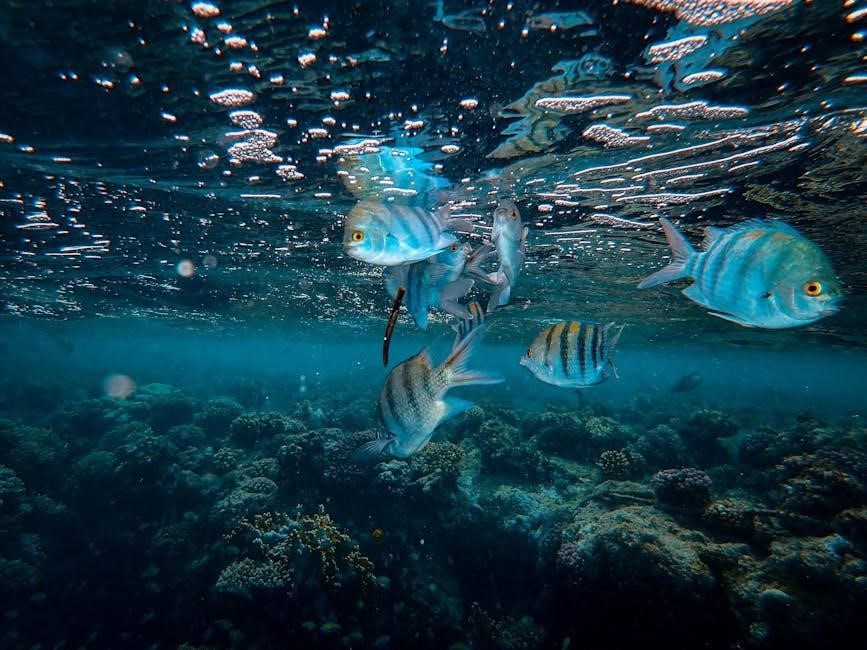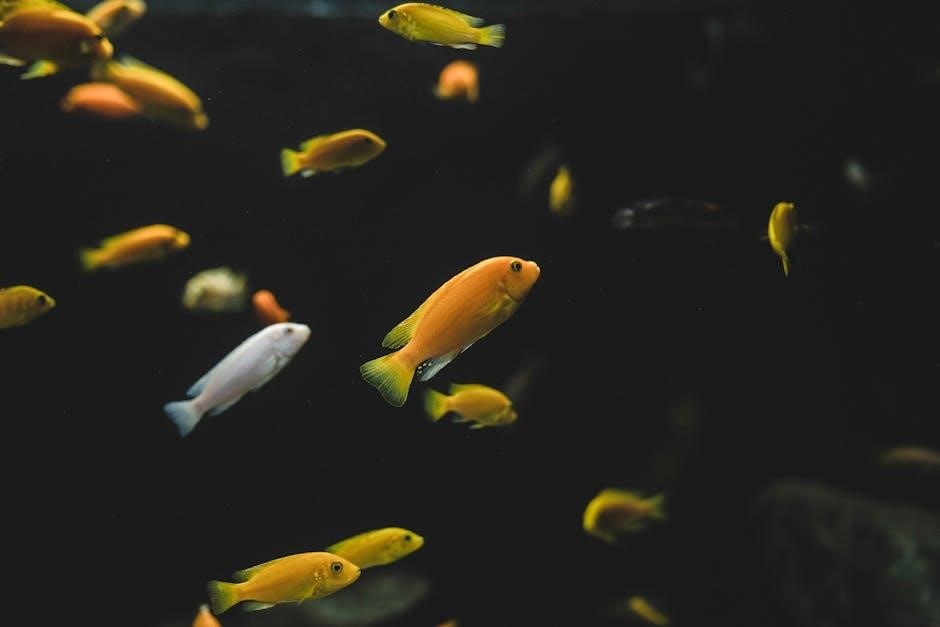Welcome to the world of fly fishing guide schools‚ where passion meets profession. These schools train aspiring guides in essential skills‚ from casting to client interaction‚ shaping industry experts.
1.1 History and Evolution of Fly Fishing Guide Schools
The history of fly fishing guide schools traces back to the 1980s and 1990s‚ when the sport gained popularity and the demand for skilled guides increased. Initially‚ these schools emerged as informal workshops led by experienced anglers aiming to share their knowledge. Over time‚ they evolved into structured programs‚ offering comprehensive training in both technical and interpersonal skills. The rise of fly fishing as a global sport drove the need for professional guides‚ leading to the establishment of formal schools. Today‚ these institutions play a crucial role in standardizing techniques‚ promoting best practices‚ and fostering a community of knowledgeable and ethical fly fishing guides.
1.2 The Role of Guide Schools in the Fly Fishing Industry
Fly fishing guide schools play a pivotal role in shaping the industry by producing skilled‚ knowledgeable‚ and professional guides. These schools set standards for excellence‚ ensuring that graduates possess both technical expertise and interpersonal skills to lead successful fishing trips. By training the next generation of guides‚ they sustain the growth of the sport and contribute to the economy of regions reliant on fly fishing tourism. Guide schools also promote ethical angling practices and environmental stewardship‚ fostering a culture of sustainability. Additionally‚ they serve as hubs for networking‚ connecting aspiring guides with industry veterans and creating opportunities for mentorship. Their influence extends beyond education‚ helping to preserve the integrity and future of fly fishing as a sport and profession.
Curriculum of Fly Fishing Guide Schools
The curriculum of fly fishing guide schools covers essential skills like casting‚ knot tying‚ and environmental awareness‚ preparing students for the demands of professional guiding.
2.1 Fly Casting Techniques and Fundamentals
Fly casting is the cornerstone of fly fishing‚ requiring precision and technique. Guide schools teach students the fundamentals‚ including basic casting strokes‚ line control‚ and presentation. Emphasis is placed on mastering roll casts‚ overhead casts‚ and the ability to adapt to varying conditions. Understanding the physics of line speed and loop formation is crucial for accurate and efficient casting. Instructors provide personalized feedback to refine students’ techniques‚ ensuring they can present flies naturally and effectively. Practice sessions are intensive‚ helping students develop muscle memory and consistency. These skills are essential for guiding clients and delivering a professional fishing experience in diverse water environments.
2.2 Entomology and Understanding Aquatic Life
Entomology‚ the study of insects‚ is vital for fly fishing guides as it helps identify the aquatic life fish feed on. Guide schools teach students to recognize insect species‚ their life cycles‚ and behaviors‚ enabling them to predict feeding patterns. Understanding nymphs‚ emergers‚ and adult insects allows guides to select flies that mimic natural prey. Additionally‚ schools cover broader aquatic ecosystems‚ including crustaceans and baitfish‚ to provide a holistic view of fish diets. This knowledge enhances fly selection and presentation‚ improving fishing success. By mastering entomology‚ guides can better advise clients on fly choices‚ ensuring effective and enjoyable fishing experiences tailored to specific conditions.
2.3 Knot Tying and Rigging Essentials
Knot tying and rigging are fundamental skills taught in fly fishing guide schools. These techniques ensure secure connections between lines‚ leaders‚ and flies‚ preventing gear loss and improving fishing efficiency. Students learn essential knots like the clinch knot‚ barrel knot‚ and surgeon’s knot‚ which are critical for setting up effective rigs. Proper rigging involves understanding leader lengths‚ tippet sizes‚ and fly placement. Mastery of these skills allows guides to quickly adapt to changing conditions and client needs‚ ensuring successful fishing experiences. By emphasizing precision and reliability‚ guide schools equip aspiring professionals with the technical expertise to handle any situation on the water confidently.
2.4 Reading Water and Identifying Fishing Hotspots
Reading water and identifying fishing hotspots are critical skills taught in fly fishing guide schools. These techniques involve understanding river dynamics‚ such as currents‚ depths‚ and structure‚ to locate areas where fish are likely to feed or rest. Students learn to recognize features like riffles‚ pools‚ and undercut banks‚ which often hold trout and other species. Instructors emphasize observation of surface activity‚ insect hatches‚ and fish behavior to pinpoint productive zones. Mastery of water reading enables guides to maximize fishing success and provide clients with memorable experiences. This skillset is refined through hands-on practice and real-world application‚ making it indispensable for aspiring fly fishing professionals.
2.5 Safety Protocols and Emergency Response
Safety protocols and emergency response training are essential components of fly fishing guide schools. These programs teach guides how to prevent accidents‚ respond to emergencies‚ and ensure client safety. Key topics include first aid‚ CPR certification‚ and handling common injuries such as sprains or cuts. Guides also learn how to manage water-related emergencies‚ such as drownings or sweeps‚ and how to use rescue equipment effectively. Understanding weather conditions and potential hazards like lightning or fast-moving water is also emphasized. Proper communication devices and emergency evacuation plans are covered to ensure quick responses in remote areas. These skills are critical for minimizing risks and providing a safe‚ enjoyable experience for clients while maintaining the integrity of the fishing environment.
Benefits of Attending a Fly Fishing Guide School
Attending a fly fishing guide school offers comprehensive knowledge‚ skill development‚ and confidence-building experiences. It prepares individuals for a successful career in guiding while fostering a deeper appreciation for the sport and its environment.
3.1 Enhanced Fishing Skills and Knowledge
Attending a fly fishing guide school significantly enhances your fishing skills and knowledge. You’ll master advanced casting techniques‚ understand aquatic ecosystems‚ and learn effective strategies for various fishing conditions. The curriculum covers essential topics like entomology‚ knot tying‚ and water reading‚ providing a comprehensive foundation. Hands-on practice allows you to refine your abilities‚ ensuring confidence and competence. Whether you’re improving personal skills or preparing for a career‚ these schools offer structured learning to elevate your fly fishing expertise. The combination of theoretical knowledge and practical experience creates a well-rounded education‚ making you a proficient angler and knowledgeable guide.
3.2 Networking Opportunities with Industry Professionals
Attending a fly fishing guide school offers invaluable networking opportunities with industry professionals. You’ll connect with experienced guides‚ instructors‚ and like-minded enthusiasts‚ building relationships that can open doors to future opportunities. Many schools host workshops and events featuring guest speakers from the fly fishing community‚ providing insights into the latest trends and techniques. These interactions not only enhance your learning experience but also create a network of contacts essential for career growth. By engaging with professionals in the field‚ you gain access to mentorship‚ job opportunities‚ and a supportive community that shares your passion for fly fishing. This networking is a cornerstone of guide school programs.
3.4 Career Opportunities in the Fly Fishing Industry
Graduating from a fly fishing guide school opens the door to a variety of career opportunities within the industry. Many alumni pursue roles as professional fly fishing guides‚ leading trips on rivers and streams worldwide. Others find success as instructors at fly fishing schools or lodges. Additionally‚ some graduates transition into retail roles‚ working in fly shops or gear companies. The skills gained‚ such as client interaction and on-water expertise‚ are highly valued by employers. With the growing popularity of fly fishing‚ there is steady demand for knowledgeable and skilled professionals. These programs also prepare individuals for roles in conservation‚ tourism‚ or lodge management‚ making them versatile in the industry.
Practical Training and Experience
Practical training is the cornerstone of fly fishing guide schools‚ offering hands-on experience in real-world scenarios. Students refine casting‚ knot tying‚ and water reading skills through immersive on-water sessions‚ preparing them for professional guiding careers.
4.1 On-Water Training and Hands-On Practice
On-water training is a cornerstone of fly fishing guide schools‚ providing students with real-world application of skills. Instructors guide students through hands-on practice‚ refining techniques like casting‚ water reading‚ and fly selection. These immersive sessions simulate actual guiding scenarios‚ helping students adapt to varying conditions and client needs. Practical experience includes wading‚ boat handling‚ and navigating diverse water types‚ ensuring students are well-prepared for the demands of professional guiding. By applying theoretical knowledge in live environments‚ students build confidence and proficiency‚ laying the foundation for successful careers in the fly fishing industry.
4.2 Simulated Guided Trips and Client Interaction
Simulated guided trips are a vital component of fly fishing guide schools‚ offering students the opportunity to practice leading trips in realistic scenarios. These exercises mimic actual client interactions‚ allowing students to refine their communication and teaching skills. Participants learn how to demonstrate techniques‚ provide feedback‚ and adapt to diverse client needs and skill levels. The simulations also focus on trip management‚ including planning‚ safety protocols‚ and handling unexpected challenges. By engaging in these role-playing exercises‚ students build confidence in their ability to lead successful fishing trips and foster positive client experiences‚ preparing them for the demands of professional guiding.
4.3 Feedback and Mentorship from Experienced Guides
Feedback and mentorship from seasoned guides are cornerstone elements of fly fishing guide schools. Students receive personalized insights to refine their techniques‚ from casting to client communication. Experienced instructors provide constructive criticism‚ helping students identify strengths and areas for improvement. Mentorship programs pair students with industry veterans‚ offering valuable guidance and real-world advice. Regular feedback sessions ensure continuous growth‚ while one-on-one interactions foster a deeper understanding of the profession. This supportive environment not only enhances technical skills but also builds confidence‚ preparing students to excel as professional guides. The mentorship aspect is often cited as a key factor in the success of fly fishing guide school graduates.

Certifications and Affiliations
Certifications and affiliations are crucial for fly fishing guide schools‚ ensuring credibility and industry recognition. Reputable schools obtain certifications from recognized bodies‚ enhancing their standing and attracting students globally.
5.1 Industry-Recognized Certifications for Guides
Industry-recognized certifications for fly fishing guides are essential for establishing credibility and competence. These certifications are awarded by reputable organizations such as the Federation of Fly Fishers (FFF) and Trout Unlimited‚ ensuring guides meet rigorous standards. They validate skills in fly casting‚ knot tying‚ entomology‚ and water reading‚ as well as safety protocols. Certifications often require both written and practical exams‚ demonstrating a guide’s ability to lead safe and successful fishing trips. Obtaining these certifications not only enhances a guide’s professional reputation but also opens doors to career opportunities in the fly fishing industry. Clients increasingly seek certified guides‚ making these credentials a valuable asset for aspiring professionals.
5.2 Affiliations with Fly Fishing Organizations
Affiliations with fly fishing organizations are crucial for guide schools and professionals. Many schools partner with organizations like Trout Unlimited‚ the Federation of Fly Fishers (FFF)‚ and local conservation groups to enhance learning and networking opportunities. These affiliations provide access to resources‚ workshops‚ and mentorship programs‚ ensuring guides stay updated on best practices. Additionally‚ they often offer exclusive certifications‚ further elevating a guide’s credentials. Affiliations also foster community involvement‚ emphasizing conservation and sustainable fishing practices. By aligning with reputable organizations‚ guide schools and graduates gain credibility‚ making them more attractive to clients and employers. These partnerships are integral to the growth and professionalism of the fly fishing industry.

Choosing the Right Fly Fishing Guide School
Choosing the right fly fishing guide school involves researching factors like program reputation‚ instructor expertise‚ hands-on training opportunities‚ and alignment with your career goals.
6.1 Factors to Consider When Selecting a School
When selecting a fly fishing guide school‚ several factors should be carefully evaluated. First‚ consider the school’s curriculum and whether it aligns with your career goals. Consider the expertise and experience of the instructors‚ as well as the quality of hands-on training opportunities. The location and access to diverse fishing environments are also crucial for gaining practical experience. Additionally‚ evaluate the school’s reputation and reviews from past students. Certifications offered and affiliations with professional organizations can enhance your credibility as a guide. Finally‚ assess the cost and value‚ ensuring the program provides a comprehensive education that justifies the investment. Each factor plays a role in shaping your future success in the industry.
6.2 Reputation and Reviews of Fly Fishing Schools
Reputation and reviews are critical when evaluating fly fishing guide schools. A school’s reputation is built on its track record of producing skilled and knowledgeable guides. Look for reviews from graduates‚ industry professionals‚ and clients who have worked with alumni. Pay attention to feedback about the quality of instruction‚ hands-on training‚ and real-world preparation. Check independent sources like forums‚ social media‚ and fishing communities to gauge credibility. Positive reviews often highlight experienced instructors‚ comprehensive curricula‚ and successful career placements. Be wary of schools with consistently negative feedback or those lacking transparency about their programs. A strong reputation ensures you’re investing in a trusted and respected education.
6.3 Cost and Value of Fly Fishing Guide Programs
The cost of fly fishing guide programs varies significantly between schools‚ depending on factors like program duration‚ instructor expertise‚ and resources provided. While some schools offer affordable options‚ others may charge premium prices for advanced training and exclusive opportunities. Prospective students should evaluate the value by comparing curriculum quality‚ hands-on training‚ and post-graduation support. Consider the long-term benefits‚ such as career opportunities and networking‚ which can justify higher costs. Additionally‚ factor in extra expenses like gear‚ materials‚ and certifications. A reputable program may initially seem costly but often provides a strong return on investment through enhanced skills and industry connections‚ ultimately leading to a successful and fulfilling career in fly fishing.

Profiles of Notable Fly Fishing Guide Schools
Discover renowned fly fishing guide schools offering specialized programs‚ expert instructors‚ and hands-on training‚ shaping the next generation of skilled professionals in the fly fishing industry.
7.1 [Name of School 1] and Its Unique Programs
Trout Haven Fly Fishing Academy stands out as a premier institution‚ offering comprehensive training for aspiring guides. Known for its immersive curriculum‚ the school emphasizes hands-on learning‚ combining theoretical knowledge with practical experience. Students master advanced casting techniques‚ entomology‚ and water reading under the guidance of seasoned instructors. The academy’s unique program includes specialized workshops on fly tying‚ knot tying‚ and client communication. With a focus on environmental stewardship‚ Trout Haven integrates eco-friendly practices‚ ensuring graduates are not only skilled anglers but also responsible conservationists. The school’s reputation for producing well-rounded professionals has made it a top choice for those pursuing careers in fly fishing.
- Advanced casting and presentation techniques
- Entomology and aquatic life studies
- Client interaction and trip management
- Environmental conservation practices
7.2 [Name of School 2] and Its Specialized Curriculum
River Mastery Fly Fishing Institute is renowned for its specialized curriculum‚ tailored to produce highly skilled and adaptable guides. The program focuses on advanced techniques for diverse fishing environments‚ including rivers‚ lakes‚ and saltwater ecosystems. Students learn to master multiple fishing styles‚ from dry fly to nymphing‚ and gain expertise in reading complex water systems. The curriculum also emphasizes client psychology‚ ensuring graduates can adapt to varying skill levels and preferences. With a strong emphasis on hands-on learning‚ River Mastery’s approach ensures students are prepared for real-world guiding scenarios. The school’s commitment to innovation and practical training sets it apart as a leader in fly fishing education.
- Advanced water reading and adaptive fishing techniques
- Specialized training for diverse fishing environments
- Client psychology and interpersonal skills development
- Innovative hands-on training methods
7.3 [Name of School 3] and Its Industry Impact
Trout Haven Guide Academy has left an indelible mark on the fly fishing industry through its commitment to excellence and innovation. With a focus on sustainability and ethical angling practices‚ the school has trained a generation of guides who prioritize environmental stewardship. Its curriculum emphasizes not only technical skills but also the importance of preserving fragile ecosystems. Trout Haven’s alumni are celebrated for their expertise and dedication‚ with many becoming leaders in conservation efforts and industry advocacy. The school’s partnerships with local fisheries and environmental organizations have further solidified its reputation as a driving force for positive change in the sport.
- Strong emphasis on environmental stewardship
- Leadership in conservation and advocacy
- Partnerships with local fisheries and organizations
- Alumni recognized for expertise and dedication
The Future of Fly Fishing Guide Schools
Fly fishing guide schools are evolving with advancements in technology and sustainability. Virtual reality training and eco-friendly practices are reshaping education‚ ensuring a future focused on innovation and conservation.
8.1 Trends in Fly Fishing Education and Training
Modern fly fishing education is evolving rapidly‚ embracing innovative teaching methods and technologies. Schools now incorporate online learning platforms‚ virtual reality simulations‚ and interactive tools to enhance student engagement. There is a growing emphasis on hands-on‚ experiential learning‚ allowing students to apply theoretical knowledge in real-world scenarios. Additionally‚ sustainability and environmental stewardship are becoming central themes in training programs‚ ensuring future guides prioritize eco-friendly practices. The integration of mental and physical wellness training is also on the rise‚ preparing guides for the demands of the profession. These trends reflect a shift toward holistic‚ adaptive‚ and forward-thinking education in the fly fishing industry.
8.2 The Role of Technology in Modern Guide Schools
Technology is revolutionizing fly fishing guide schools‚ offering innovative tools to enhance learning and practical skills. Virtual reality simulations now allow students to practice casting and navigate virtual rivers‚ improving technique in a controlled environment. Mobile apps provide real-time data on water conditions‚ weather‚ and fish behavior‚ enabling guides to make informed decisions. Additionally‚ GPS mapping tools help in identifying prime fishing locations‚ while drones are used for scouting and capturing instructional footage. Online platforms also facilitate remote learning‚ allowing students to access courses and resources globally. These technological advancements not only improve the quality of education but also prepare guides to adapt to the evolving demands of the industry.
Fly fishing guide schools offer a comprehensive path to mastering the sport and building a rewarding career. They blend tradition with innovation‚ fostering skilled professionals who preserve the art of fly fishing while adapting to modern demands. For those passionate about the outdoors and dedicated to sharing their knowledge‚ these schools provide the ideal foundation for a fulfilling journey in the fly fishing industry.
9.1 Final Thoughts on Fly Fishing Guide Schools
9.2 Encouragement to Pursue a Career in Fly Fishing
Embarking on a career in fly fishing can be a deeply rewarding path for those passionate about the outdoors and sharing knowledge with others. Fly fishing guide schools provide the foundation needed to turn this passion into a profession‚ offering skills that open doors to diverse opportunities. Whether guiding on pristine rivers‚ working in tackle shops‚ or advocating for conservation‚ the fly fishing industry offers a lifestyle that combines adventure‚ community‚ and a connection to nature. For those eager to make a meaningful impact while doing what they love‚ pursuing a career in fly fishing is an inspiring and fulfilling choice.
